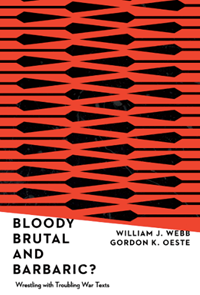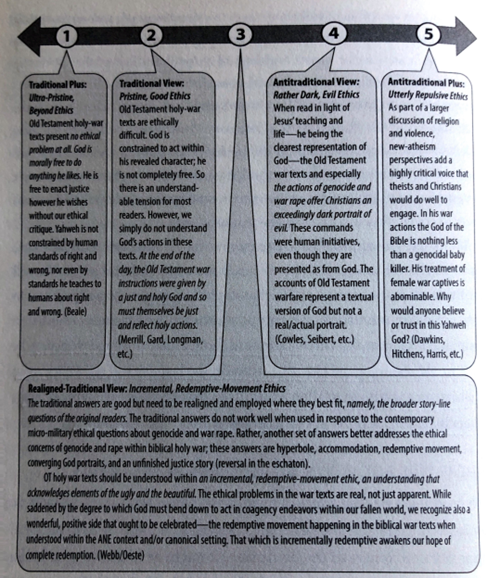The Old Testament and Holy War Texts
The Problem of War in the Old Testament is the Problem
The problem with the holy war texts of the Old Testament is that they are a problem that some think are not a problem. For many this “there is not really a problem” is not a possible solution to the problem, and below we will provide some of the important texts in the Bible.
Over my career this problem has been a problem for me, and I began to sort it out long ago with a book by Peter Craigie called The Problem of War in the Old Testament. Next I read Millard Lind’s book, Yahweh is a Warrior. Eric Seibert’s book Disturbing Divine Behavior came along and I thought I had put this aside for some time but Greg Boyd’s monster book, The Crucifixion of the Warrior God, has brought the conversation back to us. (There are many books and studies of this topic, but these are the ones that I have given most attention to.)

A new one is now available, but first here are some of the problem texts about war, quoting the NRSV:
Josh. 6:21 Then they devoted to destruction by the edge of the sword all in the city, both men and women, young and old, oxen, sheep, and donkeys.
1Sam. 15:3 Now go and attack Amalek, and utterly destroy all that they have; do not spare them, but kill both man and woman, child and infant, ox and sheep, camel and donkey.’”
Num. 21:2 Then Israel made a vow to the LORD and said, “If you will indeed give this people into our hands, then we will utterly destroy their towns.” 3 The LORD listened to the voice of Israel, and handed over the Canaanites; and they utterly destroyed them and their towns; so the place was called Hormah.
Deut. 2:34 At that time we captured all his towns, and in each town we utterly destroyed men, women, and children. We left not a single survivor.
Deut. 20:16 But as for the towns of these peoples that the LORD your God is giving you as an inheritance, you must not let anything that breathes remain alive. 17 You shall annihilate them—the Hittites and the Amorites, the Canaanites and the Perizzites, the Hivites and the Jebusites—just as the LORD your God has commanded.
Here are three problem texts about war rape:
Num. 31:17 Now therefore, kill every male among the little ones, and kill every woman who has known a man by sleeping with him. 18 But all the young girls who have not known a man by sleeping with him, keep alive for yourselves.
Num. 31:35 and thirty-two thousand persons in all, women who had not known a man by sleeping with him.
Deut. 21:10 When you go out to war against your enemies, and the LORD your God hands them over to you and you take them captive, 11 suppose you see among the captives a beautiful woman whom you desire and want to marry, 12 and so you bring her home to your house: she shall shave her head, pare her nails, 13 discard her captive’s garb, and shall remain in your house a full month, mourning for her father and mother; after that you may go in to her and be her husband, and she shall be your wife. 14 But if you are not satisfied with her, you shall let her go free and not sell her for money. You must not treat her as a slave, since you have dishonored her.
William J. Webb and Gordan K. Oeste in their new book, Bloody, Brutal, and Barbaric: Wrestling with Troubling War Texts, map out five views. (They admit there are many views between these views so this is little more than a discussion starter, but a good one.) [#ad] This book will be featured on this blog for some time so please join us in the conversation.

First, the Traditional Plus view that they describe as “Ultra-pristine, beyond ethics” in which God can do what God wants to do and, since God did these things in the Old Testament, they are ultimately good. For this view, and they class Greg Beale here, there is no ethical problem in the holy and rape texts.
Second, the Traditional view, which has “pristine, good ethics.” These texts are morally difficult, and God is constrained by character and we do not fully understand these texts. Since God is holy and just, these commands and actions by God are somehow holy and just. They connect this view to Eugene Merrill and Tremper Longman.
Third, their view: “Re-aligned Traditional View” that has “incremental, redemptive-movement ethics.” One must connect these texts to the broader story lines of that day, to the redemptive movement approach to the Bible, not to moral questions arising in our war contexts today, and they find hyperbole, accommodation, redemptive movement, converging God [OT and NT] porttaits, as well as unfinished justice that will be completed in the kingdom. The ugly and the beautiful are recognizable and recognized.
Fourth, the Antitraditional View that has “rather dark, evil ethics.” If we look to Jesus and then to these texts, the latter falls off the platform of moral behaviors and thinking. What we find in these texts is dark portraits of evil. These are human actions, human thinking, and not divine actions and thinking. We see here a “textual” version of God but not the real God. They connect this view to Eric Seibert and C.S. Cowles.
Fifth, the Antitraditional Plus view. The new atheists think the God of the Old Testament is a genocidal baby killer, some actions are abominable, and there is no reason to trust such a god. This view is connected to Richard Dawkins, Christopher Hitchens, and Sam Harris.
Knowing what people are thinking is often the pathway to learning, so this post does nothing more than present the views (as presented by Webb and Oeste).
Jesus Creed is a part of CT's
Blog Forum. Support the work of CT.
Subscribe and get one year free.
The views of the blogger do not necessarily reflect those of Christianity Today.






















